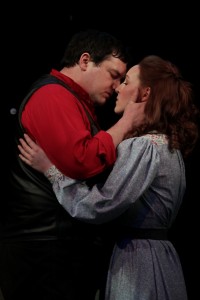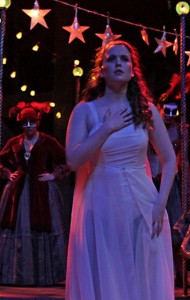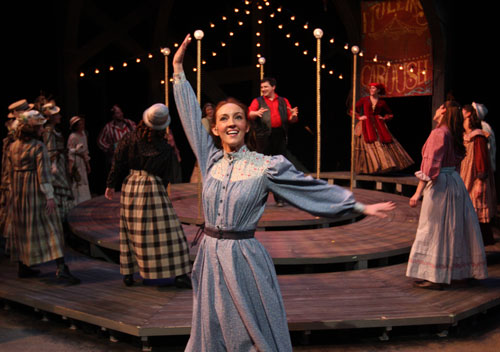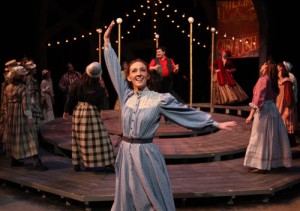Time Magazine named CAROUSEL the best musical of the twentieth century. I wouldn’t go that far, but I agree it’s Rodgers & Hammerstein’s greatest work. Like most R&H shows, it borrows heavily from other material; in this case it’s Hungarian playwright Ferenc Molnar’s 1909 drama LILIOM, which relates the tragic story of an abrasive, abusive carousel barker who falls for a simple village girl. The barker does not fit into the sociability of married life and, after a botched effort to steal money to support his family, he abruptly takes his own life, leaving his wife to raise their daughter alone.
The musical version presents several unique challenges, and Villanova Theatre’s offering successfully tackles most of them. On the technical front, the rounded set of three co-centric platforms (designed by Kate Coots) nicely accommodates Vasey Hall’s black box stage and works well as a universal backdrop for the various scenes. Director Valerie Joyce smartly chose to use an implied carousel in the prologue as opposed to a realistic replica, which would not have been feasible in this intimate venue. The cast engages in synchronized moment around the platforms that, along with moving gobos from Jerold S. Forsyth’s impressive lighting design, create a genuine carnival feel.

Michael Jansen and Jessica O'Brien in Villanova Theatre's rendition of the Rodgers and Hammerstein classic, CAROUSEL. (Photo credit: Paola Nogueras)
Overall, the vocals are praiseworthy, with standouts found in Michael Jansen’s guttural prowess as gruff barker Billy Bigelow, and the dynamic range and powerful belt of Jenny Kreyl’s kindhearted Cousin Nettie in familiar tunes “June is Bustin’ Out All Over” and “You’ll Never Walk Alone”. The ensemble dishes out superb harmonies in the chorus numbers. The orchestra, intentionally just noticeable behind a scrim, beautifully delivers the haunting melodies.
The biggest hurdle facing any production of CAROUSEL is in endearing the two leads to the audience. As written, Billy is a selfish, pigheaded bully, and yet he is our hero. Unlike Molnar’s play, here the barker ultimately must redeem himself; by the end of the musical the audience needs to feel a connection with him. His wife Julie (played nicely here by Jessica O’Brien) on the other hand, often is portrayed as weak and dominated. Accordingly, audiences tend to have difficulty relating to the leads—Billy for beating his wife, and Julie for taking it in stride. But, while at first glance Billy and Julie may seem polar opposites, beneath the surface they share the same unspoken dreams and fears.
To this end, several moments here work well. For example, the growing disappointment in Julie’s face as she silently contrasts her own hasty, lacking marriage to the pronouncement of her best friend Carrie’s (a whimsical Jen Jaynes) dream wedding is affecting. And the sequence involving Billy’s death kept the audience on the edge of their seats. Yet, despite Jansen’s acting talent and a moving “If I Loved You” sequence he performs with O’Brien, his Billy never quite endears himself to us. Of note, Billy does not cry out his wife’s name upon making his fatal choice, typically a touching realization that his love for Julie had always been at the forefront of his mind.
Presumably for the sake of run-time, Joyce made a number of cuts, most of which I agreed with (i.e. the superfluous Act I dancing), but others were puzzling. For instance, among the cuts were two humorous back-to-back Act II musical numbers between Carrie’s uptight fisherman beau Enoch Snow (an amusingly quirky Chris Monaco) and career criminal Jigger Craigin (an exceptionally slimy Ahren Potratz)—songs vital in a show that screams for comic relief. If brevity was a priority, then why include the often omitted “Highest Judge of All”? The song only serves to paint Billy in an even more unfavorable light at a time when the audience needs to start sympathizing with him.

Emily Poworoznek as Louise Bigelow in CAROUSEL, running at Villanova Theatre through April 22. (Photo credit: Paola Nogueras)
Cuts also were made to the renowned ballet sequence featuring Billy and Julie’s daughter, Louise (played enthusiastically by senior Emily Poworoznek, also the executive director of the undergrad student musical theatre program—go VSMT!). In this production, the eldest Snow daughter does not insult Billy to Louise’s face. As a result, Louise doesn’t give her a well-deserved pummeling—a missed moment both in humor and to demonstrate that she has inherited her father’s rash temper, and thus may be headed down the same perilous path.
Despite my nitpicks (and they are only nitpicks), there is much to love about Villanova’s production. In addition to the laudable technical elements and vocals, the excellent acting by principals and chorus alike engages. Each character is well-defined, with particularly entertaining moments from Jaynes, Monaco and Potratz, as well as Paul Weagraff as a humorously “down to earth” Starkeeper, and Lizzy Dalton-Negron who delivers a biting performance as the viciously jealous carousel proprietor.
Villanova’s CAROUSEL is a strong conclusion to the program’s season and one that should not be missed.
CAROUSEL
Music by Richard Rodgers
Book & Lyrics by Oscar Hammerstein, II
Directed by Valerie Joyce
March 27 – April 22, 2012
The Villanova Theatre
Villanova University, Vasey Hall
800 E. Lancaster Ave.
Villanova, PA 19085
610-519-7474
http://theatre.villanova.edu/




1 comment
Wanna CAROUSEL but you’re short on cash? Seen it once but you’re dying to see it again? Well, bring a friend and buy one ticket, get one free! Just use the code HORSEY on our website, http://www.villanovatheatre.org or call 610-519-7474.
Code: HORSEY
Valid for performances Tues. 4/17, Wed, 4/18, Thurs. 4/19